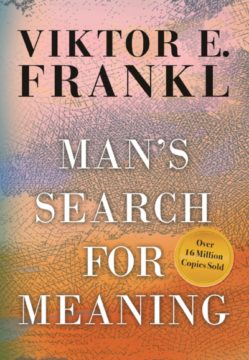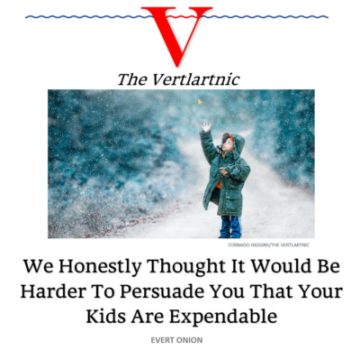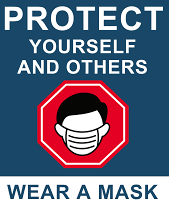by Marie Snyder
 A dear friend of mine recently passed away unexpectedly. He had recommended I read Viktor Frankl’s Man’s Search for Meaning, which I gobbled up in no time, yet it was too late to talk to him about it. That’s destroying me a bit these days, so I’m writing about it instead.
A dear friend of mine recently passed away unexpectedly. He had recommended I read Viktor Frankl’s Man’s Search for Meaning, which I gobbled up in no time, yet it was too late to talk to him about it. That’s destroying me a bit these days, so I’m writing about it instead.
Frankl survived several concentration camps, the near starvation and typhus that took many others, and explains how he coped and designed a form of psychotherapy in the process. He kept his mind on the future, imagining better days after the war, back with his wife again and lecturing about his experiences. I’ve read it trying to use his word to better tolerate the less acute, more chronic threat of Covid. It might seem trite or contrived to make such a comparison, but consider that more people have succumbed to Covid than Jewish prisoners in the camps and it continues because we are living blindly to it, unthinking. I’m hoping to learn something from his work beyond the obvious problems with allowing unfettered discrimination.
The book is in two parts. In the first, originally published in 1946, he describes his experiences living in a death camp and the three phases of survival in camp life. He wrote it after being released and returning to Vienna to learn that his pregnant wife, parents, and brother had all died in the camps. In the second half he explains how to cope with it all, but I’ll save that for next month. Page numbers throughout are from the 2006 edition.
PHASE ONE

Phase one is the period directly following admission to the camps, shock being the primary symptom (8). The prisoners clung to “shreds of hope and believed to the last moment that it would not be so bad” (10). 90% died in the first hours after arriving: women, children, and anyone unfit for labour (12).
“The culminating point of the first phase of my psychological reaction: I struck out my whole former life. . . . We really had nothing now except our bare bodies–even minus hair; all we possessed, literally, was our naked existence. . . . Most of us were overcome by a grim sense of humor. We knew that we had nothing to lose except our so ridiculously naked lives. . . . I made myself a firm promise, on my first evening in camp, that I would not ‘run into the wire.’ . . . The prisoner of Auschwitz, in the first phase of shock, did not fear death” (14-18).
Others offered him tips to stay alive: shave daily and always look fit for work; hide any limp or sores to avoid the gas. They tried to deaden painful emotions like longing for home and their disgust with the ugliness around them (20). They had to accept they could do nothing to change their situation except steel themselves to it.
From it won’t be so bad to an emotional shutdown of their past took place within a few minutes or days, or else they went mad from despair. The Stoics, Epicurus, and Lao Tzu all said versions of the famous serenity prayer, asking to be able to accept what we can’t change, have the courage to change what we can, and the wisdom to know the difference. That last part, the first step in meeting head on with difficulty, can be insurmountable. In the camps, it was all too clear that acceptance was necessary. With Covid, I keep talking myself through the courage to change things because it still can change; we don’t have to accept so much death and disability and repeat illnesses if we can only stop blindly following the rules laid out by the industries who stand to lose if we work from home or reduce outings and shopping or hope to sue our employer for failure to provide a safe workplace. Right?!?

PHASE TWO
Phase two in the camps is the period when prisoners became entrenched in camp routine, a period of emotional death lasting for years. The “mortification of normal reactions was hastened” by beatings for expressing emotions, like revulsion when being splattered with excrement (21).
“Apathy . . . eventually made him insensitive to daily and hourly beatings. By means of this insensibility the prisoner soon surrounded himself with a very necessary protective shell. . . . It is not the physical pain which hurts the most; it is the mental agony caused by the injustice, the unreasonableness of it all. . . . Apathy was a necessary mechanism of self-defense. Reality dimmed, and all efforts and all emotions were centered on one task: preserving one’s own life and that of the other fellow. . . . I always regarded the discussions about food as dangerous. Is it not wrong to provoke the organism with such detailed and affective pictures of delicacies when it has somehow managed to adapt itself to extremely small rations and low calories? Though it may afford momentary psychological relief, it is an illusion which physiologically, surely, must not be without danger” (23-30).
This raises the moral injury some of us feel observing the callousness of policies that basically write off the elderly, disabled, and immunocompromised as if they are expendable. Brain researcher Dr. Hishram Ziauddeen wrote, “More sickening than seeing what is being done is trying to imagine the mind that could do these things. . . . Moral injury is the damage done to one’s conscience when one perpetrates, witnesses, or fails to prevent acts that violate one’s moral code and ethical standards.” The rest of us shield ourselves from the deaths by no longer allowing any awareness of the situation to seep in, immersing ourselves in work and/or entertainment, which keeps us from connecting authentically and also from revolting. We know to fight against a 1984 style of authoritarianism, but we’re living in the false security of Brave New World demanding a warped version of freedom replete with soma at any cost. “Some men lost all hope, but it was the incorrigible optimists who were the most irritating companions” (34), just a different presentation of desensitization.We must stop allowing ourselves to become desensitized to it all.
Frankl describes a “cultural hibernation” enabling greater survival of those strongest mentally, not physically:
Sensitive people who were used to a rich intellectual life may have suffered much pain, but the damage to their inner selves was less. They were able to retreat from their terrible surroundings to a life of inner riches and spiritual freedom. . . . This intensification of inner life helped the prisoner find a refuge from the emptiness, desolation and spiritual poverty of his existence” (36-39).
He would regularly talk with his wife and hear her respond in a healthy delusion. Thinking of food provokes the pain of hunger, but thoughts of meeting with loved ones again can stave off loneliness. They were also carried away by the beauty of nature, the most minimal expressions of art, and a faint trace of humor.
“Humor was another of the soul’s weapons in the fight for self-preservation. It is well known that humor, more than anything else in the human make-up, can afford an aloofness and an ability to rise above any situation, even if only for a few seconds” (43).

But within a world that ignores the value of each individual’s life and dignity, prisoners started to lose themselves:
“He lost the feeling of being an individual, a being with a mind, with inner freedom. . . . He thought of himself then as only a part of an enormous mass of people; his existence descended to the level of animal life. . . . Just like sheep that crowd timidly into the center of a herd, each of us tried to get into the middle of our formations . . . to submerge into the crowd” (50).
He explained the inane bureaucracy of the sick cart that took the weakest to the next camp. “If one of the sick men had died before the cart left, he was thrown on anyway–the list had to be correct!” (52). Hannah Arendt wrote of the danger of blindly following rules with nobody responsible for them–a rule by nobody. There are still people who believe social distancing will keep us all safe.
Frankl found an inner peace by shaking off the idea that his life was in the hands of the guards or of fate, and “decided to take fate into my own hands” choosing to help typhus patients (59). Making a choice for himself returned his sense of inner freedom. The average prisoner felt like a nonentity, utterly degraded. “The consciousness of one’s inner value is anchored in higher, more spiritual things, and cannot be shaken by camp life. But how many free men, let alone prisoners, possess it?” (62-63).
“Man can preserve a vestige of spiritual freedom, of independence of mind, even in such terrible conditions of psychic and physical stress. . . . Everything can be taken from a man but one thing: the last of the human freedoms–to choose one’s attitude in any given set of circumstances, to choose one’s own way. . . . In the final analysis it becomes clear that the sort of person the prisoner became was the result of an inner decision, and not the result of camp influences alone. . . . Dostoevsky said once, ‘There is only one thing that I dread: not to be worthy of my sufferings’ . . . A creative life and a life of enjoyment are banned to him. But not only creativeness and enjoyment are meaningful. If there is a meaning in life at all, then there must be a meaning in suffering. Suffering is an ineradicable part of life, even as fate and death. Without suffering and death human life cannot be complete” (65-67).
Because the term of imprisonment couldn’t be known in the camps, he called their lives “a provisional existence of unknown limit” (70).
“His life had seemed to him absolutely without future. He regarded it as over and done, as if he had already died. . . . anything outside the barbed wire became remote–out of reach and, in a way, unreal. . . . In robbing the present of its reality there lay a certain danger. It became easy to overlook the opportunities to make something positive of camp life, opportunities which really did exist . . . an important factor in causing the prisoners to lose their hold on life. . . . Yet, in reality, there was an opportunity and a challenge. One could make a victory of those experiences, turning life into an inner triumph. . . . It is a peculiarity of man that he can only live by looking to the future. . . .
Emotion, which is suffering, ceases to be suffering as soon as we form a clear and precise picture of it. The prisoner who had lost faith in the future–his future–was doomed. Those who know how close the connection is between the state of mind of a man–his courage and hope, or lack of them–and the state of immunity of his body will understand that the sudden loss of hope and courage can have a deadly effect. . . . We needed to stop asking about the meaning of life, and instead to think of ourselves as those who were being questioned by life–daily and hourly. Our answer must consist, not in talk and meditation, but in right action and in right conduct. Life ultimately means taking the responsibility to find the right answer to its problems and to fulfill the tasks which it constantly sets for each individual. No man and no destiny can be compared. . . . Rilke spoke of ‘getting through suffering’ as others would talk of ‘getting through work.’ . . . It was a question of getting them to realize that life was still expecting something from them. . . . When the impossibility of replacing a person is realized, it allows the responsibility which a man has for his existence and its continuance to appear in all its magnitude” (71-80).
The difference between Frankl’s experiences and ours is that health, abilities, position in society, that “all these were things that could be achieved again or restored” (81). In late-stage capitalism with profits more important than people, we might not be able to restore ourselves to a former glory. What then?
He consoles us with this,
“What you have experienced, no power on earth can take from you. Not only our experiences, but all we have done, whatever great thoughts we may have had, and all we have suffered, all this is not lost, though it is past; we have brought it into being. Having been is also a kind of being, and perhaps the surest kind” (82).
He also explains a bit about the guards, that some were cruel, some hardened by the experience, and some took pity on them. We can never lump people together as good or bad because their group was good or bad:
“Human kindness can be found in all groups, even those which as a whole it would be easy to condemn. The boundaries between groups overlapped and we must not try to simplify matters by saying that these men were angels and those were devils. . . . From all this we may learn that there are two races of men in this world, but only these two–the ‘race’ of the decent man and the ‘race’ of the indecent man. Both are found everywhere; they penetrate into all groups of society” (86).
We need to rediscover our decency through consciousness of our inner values that comes only with an independence of mind that allows us to realize the impossibility of replacing an individual, that so many have been taken before their time, and that we just need the courage to change this.
PHASE THREE
Phase three of a prisoner’s mental reactions is the period following release and liberation.
“It would be quite wrong to think that we went mad with joy. . . . We had literally lost the ability to feel pleased and had to relearn it slowly. Psychologically, what was happening to the liberated prisoners could be called ‘depersonalization.’ Everything appeared unreal, unlikely as in a dream. . . . The body has fewer inhibitions than the mind. It made good use of the new freedom from the first moment on. It began to eat ravenously, for hours and days, even half the night. . . . Many days passed, until not only the tongue was loosened, but something within oneself as well; then feeling suddenly broke through the strange fetters which had restrained it. . . . We have to consider that a man who has been under such enormous mental pressure for such a long time is naturally in some danger after his liberation . . . the psychological counterpart of the bends. . . .
People with natures of a more primitive kind could not escape the influences of the brutality. . . . They became instigators, not objects of willful force and injustice. . . . Only slowly could these men be guided back to the commonplace truth that no one has the right to do wrong, not even if wrong has been done to them. . . . The experience of disillusionment is different. Here it was not one’s fellow man but fate itself which seemed so cruel. . . . There could be no earthly happiness which could compensate for all we had suffered. We were not hoping for happiness. . . . The day comes when all his camp experiences seem to him nothing but a nightmare. The crowning experience of all, for the homecoming man, is the wonderful feeling that, after all he has suffered, there is nothing he need fear any more” (87-93).
Many of us are living as if the pandemic ended despite it being a primary cause of hospitalization. Too many are being left behind in our haste to ignore our current tragedy, including children. And too many are without guides to lead them back to doing a bare modicum to keep others safe from harm, which is embarrassingly easy to do. With Covid, the more we skip to the better days while it’s still being spread, the more deaths we’ll be provoking with our unthinking behaviour. We are the prisoners and captors in this.

